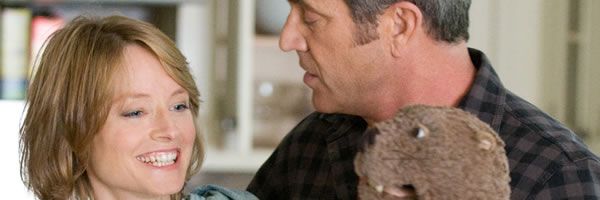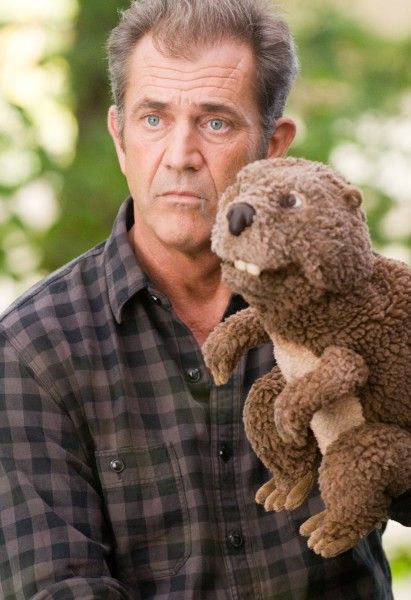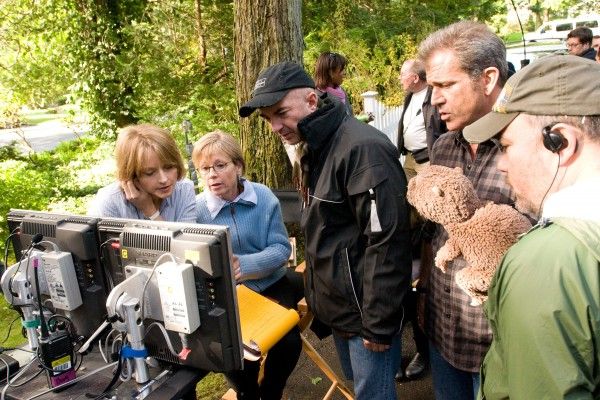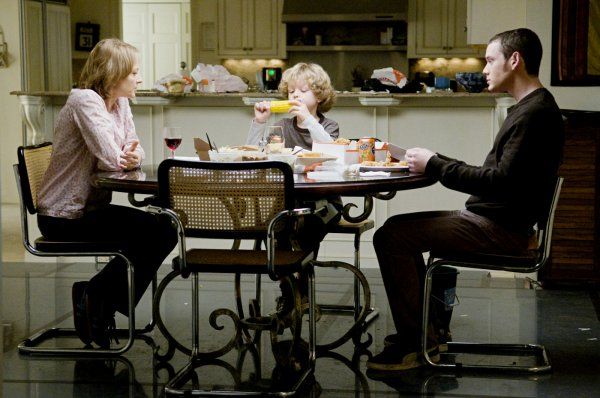The Beaver marks Jodie Foster’s return to the director’s chair, 15 years after her last feature film, Home for the Holidays. While both films tell a family story, the one in The Beaver explores depression and its effects on not only the person affliction, but all those who love them. Plagued by his own demons, Walter Black (Mel Gibson) has gone from being a successful toy executive to a man suffering so greatly from depression that he can no longer communicate with his wife (Jodie Foster) or two sons. Walter seems unable to get himself back on track, until he comes across a beaver hand puppet that he uses to reconnect with the world again. At the same time, his eldest son Porter (Anton Yelchin) is so afraid that he’s going to end up like his father that he documents even the smallest detail, to make sure that he does not turn out the same way.
At the film’s press day, actress/director Jodie Foster talked about why she wanted Mel Gibson for the role of Walter Black, choosing the right puppet and finding its voice, the challenge of acting in a film you direct, balancing work and motherhood, the appeal of doing a role in Neill Blomkamp’s next film Elysium, and the hope that she will find another directing gig soon. Check out what she had to say after the jump:
Question: What made you go with Mel Gibson for this character?
JODIE FOSTER: He’s an amazing actor. I loved working with him. He and Chow Yun Fat are my two favorite actors that I’ve ever worked with. I think everybody feels that way. It’s pretty universal in Hollywood. I knew that he had a combination of the lightness and wit that the character needed, and that he would also really understand the struggle and want to go to a deeper place, mostly just because I know him and I know how his psyche works. He’s somebody who’s interested and wants to change.
Did you have to fight with the studio to get him?
FOSTER: This wasn’t a studio film. It was Summit, who is an independent. We knew that this was not going to be a studio film. We knew this would be an independent movie, and that took a whole bunch of people off the table. There were other issues with the script that even the independents had trouble with, so that took a whole bunch of distributors away. Summit really loved Mel for the part and were incredibly supportive of him, and also supportive of the script that we had. They didn’t ask for material changes.
Why a beaver?
FOSTER: It could have been a different animal, but I think there’s something great about the industrious beaver who creates things and then destroys them. There was something about working in wood and about creativity, and that it brought Walter back into working with his hands and being creative, which is how he lost his vitality, in the first place. It could have been another animal. Maybe in the sequel.
What was the process for choosing the puppet and finding the voice?
FOSTER: Every part of choosing that is what you do in the beginning of a movie. Mel didn’t have a hand in choosing the puppet. We did that before we brought him into the process. We talked about the whole spectrum of what the puppet could be, and that it could be something that looks like a beaver, with the tail, the hair, the fur and the little beady eyes on the side of its head, which you can find at the Discovery store, or it could be a sock that had two eyes and a mouth. It could be just as abstract as it was concrete.
In the midst of that, there were a few things that we knew. We knew that we wanted him to have a childlike quality to it, we knew that we wanted him to be malleable, so that you could see the hand underneath and that you always knew there was a man manipulating it, and we knew that we wanted the audience to be aware that it was a prop being handled by a man who’s suffering. And then, when we chose to change the perspective, and have the beaver’s perspective throughout, we never did that through CGI eyes or hands moving, or anything like that.
The voice was all Mel. The accent was written in the script as English, but we didn’t say Cockney. We turned it into more blue collar because that felt right as an alter-ego to a rich man who’s had everything handed down to him. We wanted to have a blue collar puppet who is a leader, who’s somewhat remote from his emotions, who’s vital, and who has a testosterone about him. We didn’t want him to be warm and fuzzy. We wanted him to be menacing, in some ways, and to have a real strength of character, and Mel really brought that to the process.
How did you decide which hand Mel was going to use for the puppet?
FOSTER: It was my choice. He would have loved to have had the puppet on his right hand, but we needed him to do things like open doors or shake hands. We needed him to do a whole bunch of stuff with his right hand, so we needed the puppet to be on his left. Most puppeteers puppet with their dominant hand, so it’s hard to do that. Plus, in puppeteering, you have to separate your thumb, which is really painful. After a while, you cramp up.
After Little Man Tate, you said that you would never act and direct in the same film again, but you do so in The Beaver. What challenges did that present for you?
FOSTER: It is challenging. Mel and I talked about that a lot because after Man Without a Face, he said, “I’m never acting and directing again in a movie,” and he went and did Braveheart, which was also a very difficult performance. He had extensions in his hair and full on make-up, and he was in every scene. It was crazy for him to have acted in that film. I don’t find acting and directing schizophrenic, in any way. I find it completely easy to move between the two. There are a couple of liabilities. One is that it’s very difficult on your relationship with the other actors, so you have to know the other actors. I knew Mel. He’s acted and directed, and he’s a completely unneurotic actor. There’s no, “How’s my hair?” He’s just very uncomplicated in how he works, so I knew that that wouldn’t be a problem. The one bad thing is that you often don’t get choices from yourself that you might have gotten from another actor. You get what you anticipated and what you asked for, but you don’t get surprises. That’s the one thing that I miss in the cutting room. I wish I had more surprises.
Your character is a working mom, as are you. Is there a challenge to that?
FOSTER: It’s hard doing anything well, but it’s especially hard doing 10 things well. Being a parent is a full-time job, and being an artist is a full-time job, and you just have to be okay with the fact that sometimes you’re not going to be very good at either one. But, my kids seems to be okay. They’re pretty well-adjusted. I didn’t work very much when they were young, and I had the luxury to be able to do that. Most people can’t. Now that they’re older, I think they really look forward to what new adventure I’m going to get myself into. It’s more about, “Where is it going to take us as a family? What am I going to be talking about and obsessing about?” It’s not just a movie about a puppet. It’s also a movie about art, street art and all the stuff that Anton’s character writes on the Post-its. I bring all that home, so they get to live that adventure, too.
The underlying theme in this film is the whole issue of depression and how people cope with it. Was that all there in the script, or did you feel a necessity to go out and look into the ways people cope with it?
FOSTER: It definitely was there in the script, but that’s what got enhanced the most, as time went on. The thing that changed the most was the real focus on not just chronic medical and clinical depression the way Walter has, but also the other end of the spectrum, which is just the sadness and heaviness of our lives and what that means. There was a lot of work on that.
Have you ever suffered from depression?
FOSTER: Yes, definitely. It’s very important to distinguish between chemical depression that requires medication and talk therapy. It’s why it’s important, in the beginning of the movie, to see that he’s a man who has everything and not a man who’s life is non-stop tragedy. This is a guy who has a beautiful house, a wonderful family, a pool and a profession. This isn’t depression caused by circumstance. It’s important to make that distinction because, on the spectrum of depression, there are all sorts of other parts to it. Clinical, medical depression is serious business.
Do you think the movie and Mel’s performance can help him reconcile with audiences?
FOSTER: Oh, I have no idea. As far as priorities and problems in his life, I would say that’s at least third or fourth on the list. He’s got other things that he has to handle first. Look, he’s an amazingly talented man and a great filmmaker, and he will find a way to tell stories because he’s one of the greatest filmmakers we have, as a director. I’m excited to see what he’s going to do next, as a director. He’ll find a way to tell stories, even if he’s holding a boom microphone.
The L.A. Times quoted you this week as saying that you would be playing “the head of an alien planet” in Neill Blomkamp’s next film, Elysium. Would you say that’s an accurate description of the role?
FOSTER: Yes. I hope I’m allowed to say that. I think I’m allowed to say that. That’s pretty vague.
Is there anything else you can say about the film?
FOSTER: Those sci-fi movies are all really hush-hush. I don’t even own a screenplay. They won’t even give me a screenplay. I’ve read it, but they won’t give me one to physically keep in my home ‘cause they’re so worried about everybody.
What was it about that project that appealed to you and made you want to get involved? Did you just want to work with Neill Blomkamp?
FOSTER: Yes, definitely. He did District 9, which I think is as close to a perfect movie as you can get. It’s just an extraordinary film. And, this film has a lot of that social commentary in it, but uses sci-fi to get there. It’s great.
Do you think it’ll be another 15 years before you do another directing gig?
FOSTER: I hope not. I’d like to work right away. I just have to find something. It’s not easy. It’s hard to get personal films off the ground, and it’s hard developing them. If I could start in September, I would love to.





